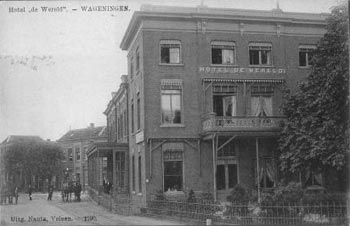 On May 5th we celebrate the end of World War II and the liberation by the allied forces. This year the celebrations are especially large since it is the 60th anniversary.
On May 5th we celebrate the end of World War II and the liberation by the allied forces. This year the celebrations are especially large since it is the 60th anniversary.
The last few years, the focus has shifted from celebrating the end of World War II to celebrating our liberty in general. I think this is a good thing, since it helps us realize that our freedom should not be taken for granted.
I am one of the 80% of Dutch people who were born after World War II and have always lived in freedom. All of my grandparents were married during the war. I can’t imagine what it must have been like for them, to be young and starting a family under those circumstances.
My paternal grandfather used to hide at my grandmother’s parents’ farm to avoid being taken to Germany to work there. My other grandfather wasn’t so lucky and was taken to a German labor camp. He stayed there until he found out my grandmother was pregnant. He escaped to attend the birth and was forced to go underground for the remainder of the war to avoid execution. This is how he joined the resistence. He ended up as a member of the staff of Prince Bernhard, the commander of the resistence in the Netherlands as well as the husband of the queen in exile. To this day, I don’t know what my grandfather’s function was and what kind of activities he was involved in. After the war was over, my grandfather never wanted to talk about that period in his life again…
Many people were surprised when World War II started. People in the Netherlands had trusted that the country could remain neutral like it had in World War I. And the prime minister had said "Rest easy tonight, all is well". The next morning, Rotterdam was bombarded and the Netherlands was involved in the war. On 10 May 1940, the Dutch government capitulated.
Over the next five years, the situation deteriorated. Especially since 1942, many Jewish people were taken from their homes and taken to concentration camps. I visited Auschwitz a few years ago which made a big impact on me.
In the Fall of 1944, the liberation started from the south. Many cities were liberated by troops from the United States, Canada, Poland and Russia. The soldiers were overwhelmed by the welcome they received. Many left behind more than they had bargained for and more than a few ‘liberation children’ were born in the summer of 1945…
For the rest of the Netherlands, things were a lot bleaker. When the winter set in, large parts of the Netherlands had been liberated but several provinces in the west were still occupied by the Germans. The winter was very severe and food and fuel was scarce. That winter is known as the ‘hunger winter’ in the Netherlands. A lot more people died from the cold and hunger that winter than by direct violence.
When Spring set in, the liberation continued and the Germans started to realize they were losing the war. Finally, on May 5, 1945, the capitulation papers were signed in Hotel de Wereld (the World) in Wageningen which is why we’re celebrating today.


